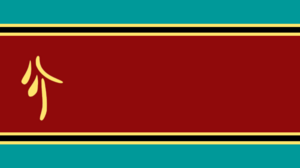Sokhanistan
Commonwealth of Sokhanistan Kulasaños'eïa Sokhanistan (Sokhainean) Samudaayika-Raajangalige Sokhanistan (Taluma) | |
|---|---|
|
Flag | |
| Motto: Good Thoughts, Good Words, Good Deeds, Good Times | |
| Capital and | Hufaidh |
| Official languages | Sokhainean |
| Recognised regional languages | Tuluma |
| Religion |
|
| Demonym(s) | Sokhani/Sokhainean |
| Government | Template:Semi-Theocratic Syndicalist Tetrarchic Directorship |
| Population | |
• 2019 census | |
| GDP (nominal) | estimate |
• Total | |
• Per capita | |
| Gini | 35.0 medium |
| Currency | Lulu (ȴ) (LUL) |
• Summer (DST) | not observed |
| Date format | yyyy-mm-dd |
| Driving side | left |
| Internet TLD | .sk |
The Commonwealth of Sokhanistan is a verdant and mountainous country located between rainforests, cloud forests, and fertile coastal plains. Its cultural heartland lies in the highlands, where ancient trade routes and terraced agriculture have shaped its history. The coastal regions, particularly near Sassalagohan, the largest city and economic center, are vibrant hubs of commerce and diversity.
The country is a syndicalist state governed by Mazdakite Zoroastrian principles, focusing on equality, communal welfare, and environmental stewardship. Each province operates as a semi-autonomous commune, with national decisions made through a council system that emphasizes consensus and direct democracy.
Sokhanistan is home to a variety of religious communities, with a majority adhering to Mazdakite Zoroastrianism and a notable Pushpambara Jain minority near the coast. The country also includes smaller communities of Sikhs, Jews, Christians, and Sufi Muslims.
Etymology
The name Sokhanistan is derived from the Sokhainean (or Soxainean) word Sokh, meaning "pure." The term Sokh refers to the purity of the people, their culture, and their connection to nature and ethical ideals. The suffix -stan, a Persian word meaning "land" or "place of". Therefore, Sokhanistan translates to "Land of the Pure People," reflecting the nation's emphasis on purity in both its cultural heritage and its guiding principles of equality, communal welfare, and environmental stewardship.
History
Government System
Sokhanistan's political structure is rooted in Mazdakite principles, emphasizing equality, communal welfare, and environmental stewardship. The government is led by four Heads of Government, collectively known as the Gohulu, and the legislative branch is divided into four distinct bodies. Each branch represents a core value of governance, ensuring a balanced and inclusive system.
The Gohulu (Heads of Government):
- Gohul Rameši (Joy): Focuses on societal well-being and cultural initiatives.
- Gohul Mobadi (Discernment): Oversees justice, ethics, and arbitration.
- Gohul Herebi (Comprehension): Manages education, innovation, and policymaking.
- Gohul Sebabi (Preservation): Responsible for environmental protection, border control, risk & resource management, and sustainable development.
Each Gohul is selected differently, reflecting the diversity of the country's values, and their responsibilities are divided to ensure a holistic approach to governance.
- Gohul Rameši (Joy): This position is filled through a democratic election. The election takes the form of a televoting competition, where entertainers, artists, and cultural figures compete to demonstrate their ability to promote happiness and unity among the people. Campaigns often involve organizing games, festivals, and parties, turning the election into a national celebration of joy and creativity. Elections are held every four years.
- Gohul Mobadi (Discernment): Candidates for this role must have completed a rigorous aptitude test and served a minimum of 20 years in a law enforcement or judicial role. This ensures they possess the wisdom and experience needed for the role. The election is closed, meaning only members of the law enforcement and judicial communities are eligible to vote. Elections are held every six years.
- Gohul Herebi (Comprehension): This role is filled through a meritocratic appointment by a council of educators, scientists, and community leaders. Candidates are evaluated based on their contributions to education, innovation, or policy research. A candidate must have at least 15 years of experience in a relevant field, such as education, technology, or public policy. Once chosen, the Gohul Herebi serves as a key figure in promoting knowledge, innovation, and understanding across Sokhanistan. Elections are held every four years.
- Gohul Sebabi (Preservation): This position is filled by a nomination process, in which environmental organizations, minority leaders, and agricultural syndicates propose candidates. These nominees must have demonstrated excellence in environmental conservation, resource management, or cultural preservation. The final selection is made through a national referendum, allowing all citizens to vote for the candidate they believe best embodies the values of sustainability and preservation. Elections are held every six years.
Rest of the Government
- Dodovulo (Joy - Combination of Judicial & Legislative Branch of Government):
- Composed of 13 Dodovo (Ombudsmen), nominated by Gohul Rameši and Gohul Herebi.
- The Dodovo travel throughout the country, gathering data, arbitrating disputes, and suggesting policies to improve the happiness and well-being of the people.
- Fomanulo (Comprehension - Legislative Branch of Government):
- Made up of 73 Fomano (Representatives) elected by the 73 provincial communes.
- Responsible for drafting and proposing legislation, often in collaboration with local syndicates and political organizations.
- Pešigulo (Preservation - Legislative Branch of Government):
- Includes 25 Pešigo (Provosts), selected based on expertise in environmental sciences, resource management, and sustainability.
- Essentially acts an upper legislative house. 
- Their main task is to review laws for environmental and cultural impact, ensuring policies align with Sokhanistan's principles of preservation.
- Mobadulo (Discernment - Judicial Branch of Government):
- A council of 9 Mobadio (Judges), appointed by Gohul Mobadi, tasked with interpreting laws and ensuring they adhere to the country's ethical and legal standards.
- Acts as the highest judicial authority and mediates between other branches when needed.
